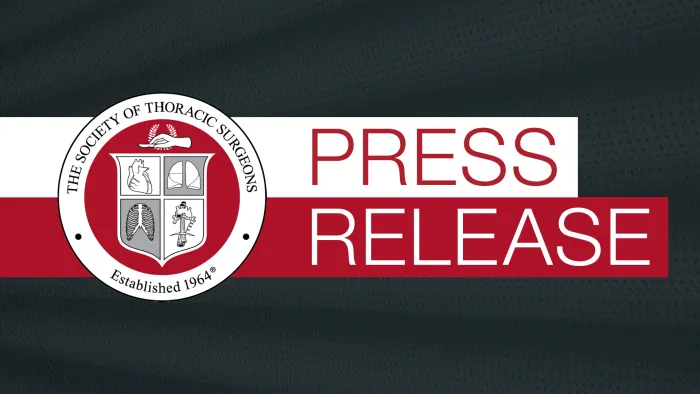STS News, Fall 2022 — More than 50 cardiothoracic surgeons, residents, and medical students participated in the Society’s first in-person Advocacy Conference since 2019. STS members met with lawmakers to discuss several key issues of critical importance to STS members and their patients.
“The Advocacy Conference is really important for each and every one of us in STS—to get together with colleagues and discuss what is really important in our specialty and, more importantly, for our patients, so that we can make health care better,” said Patrick T. Roughneen, MD, from UT Health Houston McGovern Medical School. “We are here together to talk with members of Congress, and they are very receptive to our voice.”
Participants connected with several legislative decision makers during the conference. In addition, STS President John H. Calhoon, MD, presented Rep. Kim Schrier, MD (D-WA), with the STS Legislator of the Year Award. Rep. Schrier discussed the physician workforce shortage and her continued efforts to help stall physician Medicare payment cuts.
“What we need is a permanent solution to Medicare reimbursement cuts,” she said. “Every year, the payment cuts come up, and it always is a crisis at the end of the year. I happen to think this is a good time for doctors to make their case, as we are losing physicians to retirement and resignation. This is a moment to make a play for that permanent solution, and I'm working with my committee to help.”
STS members also heard from Rep. Larry Bucshon, MD (R-IN), a cardiothoracic surgeon, and Rep. Mariannette Miller-Meeks, MD (R-IA), an ophthalmologist, who provided perspective about the current Congress and its focus for the remainder of 2022.
Reps. Bucshon and Miller-Meeks emphasized the importance of surgeon participation in advocacy and answered questions from participants. They explained their roles in temporarily halting Medicare reimbursement cuts for surgeons this year and their hopes to work with health care providers on a more permanent solution. Rep. Bucshon also discussed the bill he cosponsored with Rep. Schrier that would help registries like the STS National Database to facilitate innovation and quality improvement.
Dr. Joseph Cleveland Jr. sits down with Rep. Jason Crow (D-CO) during the STS Advocacy Conference.
During the conference, STS members met with House and Senate representatives in Congress and their staff, urging them to take action on three issues that are especially important to the specialty.
“It’s a great experience to be in the city of Washington, DC, and connecting face to face with members of Congress and legislative assistants, talking about issues that help our specialty and our patients. There’s nothing like it—a lot of energy,” said Karen M. Kim, MD, from the University of Michigan in Ann Arbor.
Ask #1: Stop Medicare Reimbursement Cuts
The Centers for Medicare & Medicaid Services (CMS) has proposed to cut the Medicare conversion factor—the multiplier used to calculate the amount of Medicare payment using the relative value unit of a procedure or service—by 4.42%. Even worse, additional budget-related cuts will be layered on top starting in 2023. In addition, some estimates show the cost of running a medical practice has increased by 37% between 2001 and 2020. The startling reality is that, when adjusted for inflation in practice costs, Medicare physician pay actually declined 22% from 2001 to 2020.
Unless Congress steps in again, cardiothoracic surgeons could see Medicare payment cuts of up to 8.5% in 2023. Reductions of this magnitude represent a very real threat to the financial viability of clinical practices and could limit patient access to care.
Ask #2: Support Access to Claims Data
Medicare claims data, when linked with clinical outcomes data in registries such as the STS National Database, allow researchers to conduct longitudinal analyses to measure quality improvement and improve patient safety. Currently, regulatory barriers prevent registries from linking claims data with clinical outcomes data. In order to help improve quality of care and perform important research, registries need timely, cost-effective, and continuous access to these data.
Ask #3: Support the Resident Physician Shortage Reduction Act
A key factor impacting the shortage of physicians is the artificial cap placed on Medicare-supported graduate medical education (GME) positions. This bill would help
mitigate the physician shortage by creating 14,000 new GME slots over 7 years.
In December 2020, Congress provided 1,000 new Medicare-supported GME positions—the first increase of its kind in nearly 25 years. While this is progress, more support is needed. The Resident Physician Shortage Reduction Act of 2021 is a step in the right direction.
Dr. John Calhoon and other STS members met with Rep. Larry Bucshon (R-IN) and other members of Congress.
Miss the STS Advocacy Conference? You Still Can Be Involved!
If you could not attend the STS Advocacy Conference, you still have a chance to meet with your federal representatives.
STS members are the most effective advocates for the specialty and patients; contact the STS Government Relations office at advocacy@sts.org or 202-787-1230 for help with setting up a meeting or site visit.
